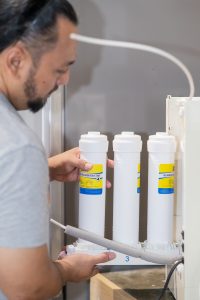What Kind of Water Treatment System Should You Get?
 When you buy a home, the seller may or may not disclose whether it has an existing well and water treatment system. Even if it does, it’s possible that the system is broken and needs to be replaced. Because these systems are out of sight and underground, they’re easy to overlook. However, they can have a big impact on your quality of life as a homeowner. If your new home doesn’t have an existing water treatment system, or you know that yours isn’t functioning properly, you need to install one before moving in. A water treatment system deals with the water coming into your home from the wells. These systems commonly treat the water so that it is safe to drink, clean enough to use for laundry or bathing and soft enough for houseplants without leaves that can’t tolerate hard water. It also prevents groundwater contamination through runoff from surface irrigation and other means…
When you buy a home, the seller may or may not disclose whether it has an existing well and water treatment system. Even if it does, it’s possible that the system is broken and needs to be replaced. Because these systems are out of sight and underground, they’re easy to overlook. However, they can have a big impact on your quality of life as a homeowner. If your new home doesn’t have an existing water treatment system, or you know that yours isn’t functioning properly, you need to install one before moving in. A water treatment system deals with the water coming into your home from the wells. These systems commonly treat the water so that it is safe to drink, clean enough to use for laundry or bathing and soft enough for houseplants without leaves that can’t tolerate hard water. It also prevents groundwater contamination through runoff from surface irrigation and other means…
Know Your Options
If you want to install a water treatment system in your home, you have three types to choose from: a water softening system, a reverse osmosis water treatment system and a UV light water treatment system. Only one of these is actually a water treatment system and not a water filtration system. So, before you decide what to get, you need to know the difference between the two. A water filtration system removes contaminants from your water by using a physical barrier. This can be done with an activated carbon filter, a sand filter or a cartridge filter. These filters remove dirt and other particles from your water that may affect the taste and smell. They do not, however, do anything to improve the quality of the water. A water treatment system, on the other hand, treats the water so that it is safe to drink and meets certain health and quality standards. It removes contaminants such as lead and other heavy metals, pesticides and other organic chemicals, bacteria and other microbes and other unwanted substances that may be present in the water supply.
Water Softening System
A water softening system uses a chemical treatment process that exchanges the calcium and magnesium ions in the water with sodium ions found in the treatment solution. The calcium and magnesium are what cause the water to be hard, so removing them softens the water. While this may sound like a good thing, too much soft water can cause problems with your plumbing. It can leave a film on dishes, shower doors and faucets. If you live in an area with hard water and want to install a water softening system, you’ll need to install a water softening system with a water conditioner that also uses a carbon filter to remove any additional impurities from the water.
Reverse Osmosis Water Treatment System
A reverse osmosis water treatment system uses a semi-permeable membrane to separate the contaminants from the water. The contaminants are then sent to a waste container and the clean water is sent to your house for use. This system is a very effective water treatment method. It removes about 99 percent of the contaminants in your water such as bacteria, lead and other heavy metals, pesticides and other organic chemicals. It does have some limitations, though. It is not effective against substances such as nitrates and fluoride that are naturally occurring. It also doesn’t deal with particles in the water. If your water has a lot of suspended solids that aren’t dissolved and are too big to go through the membrane, they will clog the membrane and cause the system to fail.
UV Light Water Treatment System
A UV light water treatment system uses ultraviolet light to kill bacteria, viruses and other microbes in the water. While this is a great way to sanitize water, it doesn’t do anything to improve the quality of the water. It also requires a very high maintenance schedule. You’ll need to regularly change the UV light bulbs, check the flow of water through the system to make sure it isn’t clogging anywhere and replace any parts that have worn out. This system is best used in conjunction with another type of water treatment system that removes contaminants from the water. A UV light water treatment system is ideal for homeowners who want the simplicity of having one system that does it all.
Conclusion
The health of your family and the quality of life in your home can depend on your choice of water treatment system. You need to make sure that you choose the one that best suits your needs. If you care about the taste and smell of your water, an activated carbon filter may be a good choice. If you want cleaner and better-tasting water that is free of contaminants, a reverse osmosis water treatment system is your best option.
